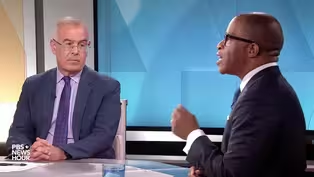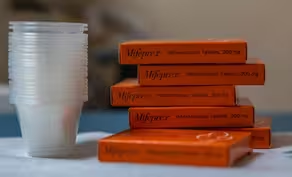
Thousands flee Myanmar amid flare up in civil war fighting
Clip: 5/24/2024 | 6m 46sVideo has Closed Captions
Thousands flee Myanmar for Thailand amid flare up in civil war fighting
Myanmar’s civil war has taken a critical turn in recent weeks following a series of defeats for the military junta that reclaimed power in 2021. The exiled civilian government, deposed in that coup, says victory for their resistance is coming soon. But there are fears of a violent struggle as the military attempts to regain lost ground. Special correspondent Patrick Fok reports.
Problems playing video? | Closed Captioning Feedback
Problems playing video? | Closed Captioning Feedback
Major corporate funding for the PBS News Hour is provided by BDO, BNSF, Consumer Cellular, American Cruise Lines, and Raymond James. Funding for the PBS NewsHour Weekend is provided by...

Thousands flee Myanmar amid flare up in civil war fighting
Clip: 5/24/2024 | 6m 46sVideo has Closed Captions
Myanmar’s civil war has taken a critical turn in recent weeks following a series of defeats for the military junta that reclaimed power in 2021. The exiled civilian government, deposed in that coup, says victory for their resistance is coming soon. But there are fears of a violent struggle as the military attempts to regain lost ground. Special correspondent Patrick Fok reports.
Problems playing video? | Closed Captioning Feedback
How to Watch PBS News Hour
PBS News Hour is available to stream on pbs.org and the free PBS App, available on iPhone, Apple TV, Android TV, Android smartphones, Amazon Fire TV, Amazon Fire Tablet, Roku, Samsung Smart TV, and Vizio.
Providing Support for PBS.org
Learn Moreabout PBS online sponsorshipGEOFF BENNETT: Myanmar's civil war has taken a critical turn in recent weeks following a series of defeats for the military junta that reclaimed power in 2021.
The exiled civilian government deposed in that coup says victory for their resistance is coming soon.
But there are fears of a violent struggle as the military attempts to regain lost ground.
Neighboring Thailand is nervously watching.
Thousands of people have spilled over the border in recent weeks to escape the fighting, from where special correspondent Patrick Fok reports.
PATRICK FOK: Over the last few weeks, fierce gun battles have erupted across Myanmar's Kayah State.
Rebel fighters have made major advances and forced hundreds of government soldiers to surrender.
It's been an intense period for the resistance.
Many of the rebels, like combat fighter Ko Thoo and his wife, who's also part of the resistance, are now recuperating in the Thai border town of Mae Sot.
KO THOO, Combat Fighter, People's Defense Forces (through translator): I rented this place.
We live here because we cannot get the front line all the time.
We need to rest and take care of our health.
We also need to look after family matters.
PATRICK FOK: Ko Thoo comes from Magway region in Central Myanmar and ran a fitness center business before the conflict began.
He joined the resistance just days after the military ousted the country's democratically elected government, led by the longtime dissident-turned-politician Aung San Suu Kyi in February 2021.
Since then, it's been racked by violence.
The Armed Conflict Location and Event Data Project, which tracks around 50 wars globally, estimates more than 50,000 people, including civilians and resistance fighters, have been killed.
Ko Thoo carries the memory of some of those he fought alongside on his chest.
KO THOO (through translator): That's our battalion emblem.
Comrades died.
Some were arrested by military.
Some are in jail.
PATRICK FOK: Mae Sot has an official population of around 50,000 people.
But that number has swelled as a result of the war, with some experts estimating there could be an additional 100,000 Burmese, as natives of Myanmar are known, seeking shelter here.
In recent weeks, thousands more have poured over to escape the fighting.
Many come over via the border checkpoint here at Friendship Bridge, but it's hard to stop even more crossing illegally along the nearly 200-mile-long Moei River, separating Thailand and Myanmar, among them, 26-year-old Aye Aye Thin who's both very pregnant and clearly desperate.
She and her husband left their village after it was struck by government air raids.
AYE AYE THIN, Myanmar Refugee (through translator): I came here with my husband.
We walked across the river.
The bridge was closed, and I couldn't wait for it, so we crossed illegally.
The water level was high.
PATRICK FOK: In Mae Sot, Aye Aye Thin relies on the help of a supporter of the Burmese resistance.
But conditions are tough and she fears being arrested by Thai border authorities.
AYE AYE THIN (through translator): It's difficult.
I live with other people.
I eat what others give us.
They're not even related.
I just asked for help.
I met her, that person online.
She accepted my request.
I haven't had problems with the police so far because I don't go outside.
PATRICK FOK: Thailand is not a signatory to the United Nations Refugee Convention, so it doesn't distinguish asylum seekers from illegal immigrants.
It has pledged to accept up to 100,000 Myanmar refugees, but it's also arrested and pushed back many of those that have come across seeking shelter over the last few weeks.
Adding to the recent influx are many young men.
Earlier this year, the government in Myanmar introduced compulsory military service.
It wants to bolster its ranks following recent defeats.
According to the United States Institute of Peace, the junta has lost control of around half of the roughly 5,000 military positions it holds, including outposts, bases and headquarters.
Elliott Prasse-Freeman is an assistant professor at the Department of Sociology and Anthropology and an expert in Myanmar at the National University of Singapore.
ELLIOTT PRASSE-FREEMAN, National University of Singapore: So this conscription law was a sort of nuclear option.
It has the danger of really backfiring on them, because it forces people who don't necessarily feel like they want to take a stand on this to choose a side.
And they're certainly not most likely going to choose the side of the people who are forcibly conscripting them to fight against their friends and to fight against democracy.
PATRICK FOK: Nevertheless, reports say government troops are launching a counteroffensive and are moving towards Myawaddy on the other side of the border.
Traditionally, it's been a stronghold for the military, but its grip has been severely weakened following recent battles.
Billions of dollars of trade passes through Myanmar each year, making it strategically vital.
There are fears of further violence now as the junta attempts to regain control.
Meanwhile, Thailand is pushing for dialogue between the junta and rebel forces.
But there's little appetite for negotiation among the resistance.
ELLIOTT PRASSE-FREEMAN: One of the issues is, you kind of only get one shot at a transition.
You only get one shot at a credible peace.
There's no way that the Burmese military can credibly commit to a peace or another democratic transition, because it's very hard to -- for the resistance to take them seriously.
PATRICK FOK: The exiled civilian administration known as the National Unity Government says, since forming an alliance with ethnic armed forces a year ago, the resistance has seized control of more than 60 percent of the country.
But it's come at a terrible cost for many fighters.
At this makeshift rehabilitation clinic hidden on the outskirts of Mae Sot, rebel soldiers injured in the conflict are recovering.
Myo Min, who worked in marketing prior to the war, lost his leg when he stepped on the land mine in the battlefield just a few weeks ago.
MYO MIN, Resistance Fighter (through translator): My gun was thrown by the explosion.
I saw my foot scattered, meat and bone.
PATRICK FOK: Despite his condition, he says he plans to go back and fight when he's built up his strength.
MYO MIN (through translator): I think victory is drawing near, but we still have a long way to go.
No one is helping us.
We only have ourselves.
PATRICK FOK: Experts say there's a lot riding on the outcome of the battle of Myawaddy.
A complete takeover by the resistance could accelerate gains elsewhere.
But the military still has superior firepower and is unlikely to retreat without a fight, meaning there will likely be many more casualties on both sides.
For the "PBS NewsHour," I'm Patrick Fok in Mae Sot, Thailand.
Airlines working to create sustainable aviation fuel
Video has Closed Captions
Clip: 5/24/2024 | 8m 21s | How airlines are working to create sustainable fuel to reduce aviation's carbon footprint (8m 21s)
British pubs struggle to survive as drinkers stay home
Video has Closed Captions
Clip: 5/24/2024 | 5m 14s | British pubs struggle to survive as drinkers stay home (5m 14s)
Brooks and Capehart on Nikki Haley supporting Trump
Video has Closed Captions
Clip: 5/24/2024 | 12m 11s | Brooks and Capehart on Nikki Haley announcing her support for Trump (12m 11s)
Louisiana reclassifies abortion pills, restricting access
Video has Closed Captions
Clip: 5/24/2024 | 5m 32s | Louisiana restricts access to abortion pills by classifying them as a controlled substance (5m 32s)
NCAA and schools reach agreement to pay college athletes
Video has Closed Captions
Clip: 5/24/2024 | 6m 56s | What the historic $2.8 billion settlement to pay NCAA players means for college sports (6m 56s)
Providing Support for PBS.org
Learn Moreabout PBS online sponsorship
- News and Public Affairs

FRONTLINE is investigative journalism that questions, explains and changes our world.

- News and Public Affairs

Amanpour and Company features conversations with leaders and decision makers.












Support for PBS provided by:
Major corporate funding for the PBS News Hour is provided by BDO, BNSF, Consumer Cellular, American Cruise Lines, and Raymond James. Funding for the PBS NewsHour Weekend is provided by...




